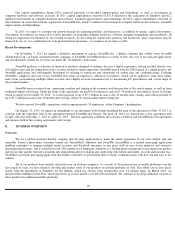Incredimail 2012 Annual Report Download - page 33
Download and view the complete annual report
Please find page 33 of the 2012 Incredimail annual report below. You can navigate through the pages in the report by either clicking on the pages listed below, or by using the keyword search tool below to find specific information within the annual report.
Government Regulation
The United States, the United Kingdom, the European Union, Israel and other jurisdictions have adopted laws that could have an impact
on our business, including the ones described in this section.
There are still relatively few laws or regulations specifically addressing the Internet. In some instances, in the European Union
particularly, those that have been implemented are dating rapidly as online practice (and particularly social commerce and the extent of online
interaction and communication) evolves. As a result, the manner in which existing laws and regulations should be applied to the Internet in
general, and how they relate to our business in particular, is unclear in many cases and varies from county to country. Such uncertainty arises
under existing laws regulating matters, including user privacy, defamation, access changes, “net-neutrality”
pricing, advertising, taxation,
gambling, sweepstakes, promotions, content regulation, quality of products and services, and intellectual property ownership and infringement.
To resolve some of the current legal uncertainty, it is possible that new laws and regulations (and associated guidance) will be adopted
that will be directly applicable to our activities. Any existing or new laws, regulations or legislation applicable to us could expose us to potential
liability, including significant expenses necessary to comply with such laws and regulations, and could dampen the growth in use of the Internet
in general. In connection with this, some of the countries in which we operate have increased their enforcement of local laws and therefore the
potential impact of failing to comply with local and international legislative requirements has increased significantly.
When users visit our website or install and use our software, certain "cookies" (pieces of information sent by a web server to a user’
s
browser) may be generated by us and third parties with whom we cooperate, including our advertisers, and may be placed on our customers’
computers. While we believe that our use of cookies does not result in personal identification, it has been argued that Internet protocol addresses
and cookies are intrinsically personally identifiable information that is subject to privacy standards. In addition, the impact of new regulation in
the European Union is that, regardless of personal identification via cookies (or any similar devices), there are now obligations to inform
consumers how cookies are used and to provide information about cookies. Unless limited exceptions apply, we will now only be able to place a
cookie on terminal equipment where the user or subscriber has given their consent. We cannot assure you that our current policies and
procedures will meet these restrictive standards, but we will continue to assess our use of cookies, and where necessary, work with third parties
serving cookies via our websites and take steps to provide transparency, as well as assess which solution for obtaining user consent will be most
appropriate. The compliance situation is compounded as not all of the E.U. legislation is currently in force and there are likely to be a number of
variations in the approach and regulations. Today we have limited technical or operational capability to vary our website or practices on a
country to country basis. There are no specific laws restricting the use of such cookies in the United States. While some courts there previously
questioned whether placement of cookies on a user’s hard drive is permissible without the user’
s consent, to the best of our knowledge no
liability has been found.
Our approach to privacy and data protection compliance includes both technological solutions and a focus on employee awareness and
behavior. We post our privacy policy and practices concerning cookies and the use and disclosure of user data on our websites. Our websites
inform users through our privacy policy what information we collect about them and about their use of our services. As mentioned above, in the
European Union at least, it is likely that further transparency and consent will be required in connection with some of our activities which use
cookies and similar technologies. We also provide users with the opportunity to opt out of receiving certain communications from us.
Any failure by us to comply with our posted privacy policy, FTC requirements or other domestic or international privacy-
related laws
and regulations could result in proceedings by governmental or regulatory bodies that could potentially harm our business, results of operations
and financial condition, or result in private civil actions for damages and equitable relief. In addition, abuse by third parties of the data we collect
could potentially subject us to liability. In addition, the negative public perception, potential reputational damage and associated public concern
over privacy practice may equally impact our business in the event of any adverse publicity around failure to comply or any regulatory
investigation into our practices.
27
























